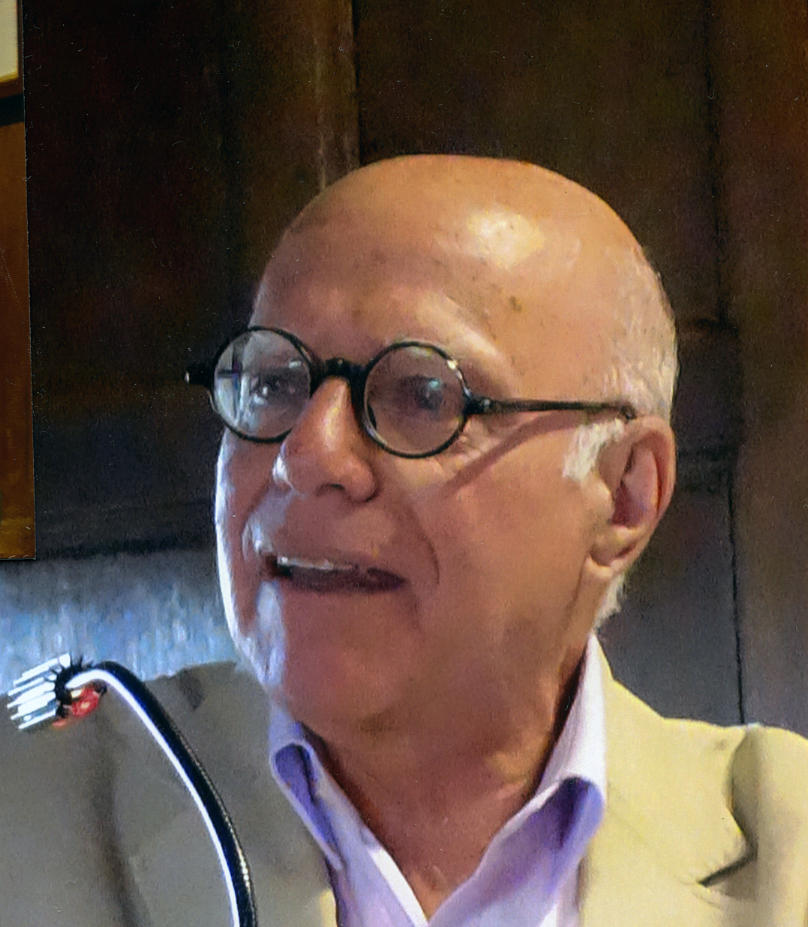Challenges of Cultural history and Interdisciplinarity
Cultural historian George Rousseau (Oxford University) is known as one of the founders of the internationally established field of Literature and Science, and of Literature and Medicine, academic attainments that will feed into the seminars he offers as a Visiting Professor in the second quarter of 2017, 2018 and 2019. He will deliver seminars on the theory and methodology of cultural history, and the challenges of interdisciplinarity, especially in relation to microhistories of ageing.

Main content
PROFESSOR GEORGE ROUSSEAU SEMINAR SERIES
Challenges of Interdisciplinarity
for a Cultural History of Ageing:
Theoria & Praxis
MAY 29 – 31, 2017
Dragefjellet, Auditorium 2
Sponsored by the NFR SAMKUL programme, and in collaboration with Professor Bernt Engelsen (Haukeland University Hospital) and Curator Eli Okkenhaug (KODE Art Museums in Bergen)
May 29
14.15-15.00: Professor George Rousseau (University of Oxford),
‘This is just about old people – why should we be interested?’
• Why study the old and what it tells us about ourselves
• Aging and old age in the humanities and sciences
Bibliography
Bradley, Ben, Fred Feldman, and Jens Johansson. The Oxford Handbook of the Philosophy of Death. New York: Oxford University Press, 2013.
Kinsley, Michael E. Old Age: A Beginner's Guide. London: Rider Books, 2017.
Volkan, Vamik D., and Elizabeth Zintl. Life after Loss: The Lessons of Grief. London: Karnac Books, 2015.
15.15-16.00: Professor George Rousseau,
Theoria: Further reflections on interdisciplinarity in the twenty-first century
• approaches to studying ageing: disciplines and the division of knowledge
• the formation of young, maturing, and old-age disciplines
• the forging of a 'new interdisciplinarity' to navigate the increasingly narrow gap between the humanities and the sciences
• Ageing and the production of future disciplinary knowledge
Bibliography
Callard, Felicity, and Des Fitzgerald. Rethinking Interdisciplinarity across the Social Sciences and Neurosciences. Neuroscience Intersections. Basingstoke, Hampshire: Palgrave Macmillan, 2015.
Fish, Stanley. "Being Interdisciplinary Is So Very Hard to Do." In There's No Such Thing as Free Speech, 231-42. Oxford: Oxford University Press, 1994.
Hareven, Tamara K., and Kathleen J. Adams. Ageing and Life Course Transitions: An Interdisciplinary Perspective. New York: Tavistock Publications, 1982.
Hofer, Scott M., and Duane F. Alwin. Handbook of Cognitive Aging: Interdisciplinary Perspectives. Los Angeles: Sage Publications, 2008.
McKeon, Michael. "The Origins of Interdisciplinary Studies." Eighteenth-century Studies 28, no. 1 (1994).
Rousseau, G. S. "Riddles of Interdisciplinarity: A Reply to Stanley Fish." In Intercultural Encounters - Studies in English Literature, edited by Heinz and Kevin L. Cope Antor, 111-30. Heidelberg: C. Winter, 1999.
16.15: Curator Eli Okkenhaug (KODE), title to be announced
16.30 RECEPTION
_________________________________________________________
May 30
14.15-15.00: Professor George Rousseau,
Praxis: ‘How can I do this work?’
• ageing and methodology: what are the available approaches to ageing?
• what ‘late style’ tells us about how we can do our work
• the fusion of theory and praxis in approaches to ageing and old age
Bibliography
Delbanco, Nicholas. Lastingness: The Art of Old Age. New York and London: Little, Brown, 2011.
Drabble, Margaret. The Dark Flood Rises. Edinburgh: Canongate, 2016.
Feinberg, Todd E. From Axons to Identity: Neurological Explorations of the Nature of the Self. The Norton Series on Interpersonal Neurobiology. 1st ed. New York: W. W. Norton, 2009.
Grand, Jacob HG, Sienna Caspar, and Stuart S. MacDonald. "Clinical Features and Multidisciplinary Approaches to Dementia Care." Journal of Multidisciplinary Healthcare, no. 4 (2011): 125-47.
15.15-16.15: Professor Bernt Engelsen (University of Bergen and Haukeland University Hospital),
‘The ageing self in an epileptological and neuropsychiatric setting, with reflections on empathy’
• self as a mental image of a fragmented neuronal composition with cerebral gates of interactive areas and functions.
• self in epilepsy and neuropsychiatry
• neurodegeneration reveals transient and lasting alterations in self states and state shifts.
Bibliography
Horowitz MJ. “Configurational analysis of the self: a states-of-mind approach’, in JC Muran (ed), Self- relations in the psychotherapy process. Washington DC. American Psychological Association 2001: 67-81.
Vøllestad J. Det mangfoldige selvet: teorier om selvtilstander i kognitiv og psykodynamisk psykoterapi.Tiddskrift for Norsk Psykologforening. 2006; 43, 940-948.
Shany-Ur T, et al. Self-awareness in neurodegenerative disease relies on neural structures mediating reward-driven attention. Brain 2014 137: 2368-2381.
________________________________________________
May 31
14.15-15.00: Professor George Rousseau,
‘History Lessons: Revisiting the 3rd and 4th Ages of Man’
• what history shows us about ageing and lateness: the concepts of ‘earlier ages’ and ‘later ages’
• who constructed the 3rd and 4th ages of man?
• the major historical and cultural forces driving these two new ages
• decline and declinism in the 3rd and 4th ages of man
• is declinism an illusion?
Bibliography
Higgs, Paul, and C. J. Gilleard. Rethinking Old Age: Theorising the Fourth Age. Basingstoke: Palgrave, 2015.
Hutchinson, Ben. Lateness and Modern European Literature. Oxford: Oxford University Press, 2016.
Gullette, Margaret Morganroth. Aged by Culture. Chicago; London: University of Chicago Press, 2004.
Laslett, Peter. A Fresh Map of Life: The Emergence of the Third Age. 2nd. ed. Basingstoke: Macmillan, 1996.
15.15-16.00: Professor George Rousseau,
Imagining the 5th Age of Man: Fantasy or Fiction?
• what is the 5th age of man?
• self, selfhood, and personhood in the new age: the aggregate of affect
• affects of loss versus affects of forgetting
• the appearances of declinism in the 5th age of man
• history, memory and decline in the 5th age
• the inhumane treatment of centenarians in the 5th age
• extinction and evolution: evolving rather than losing and forgetting
Bibliography
Atul Gawande, Being Mortal: Illness, Medicine and What Matters in the End. London: Profile Books, 2015.
Shabahangi, Nader. "Humanistic Eldercare: Towards a New Conceptual Framing for Aging." Chap. 16 In The Handbook of Humanistic Psychology: Theory, Research, and Practice, edited by Kirk J. Schneider, J. Fraser Pierson and James F. T. Bugental, 213-26: Sage, 2014.
Taylor, Charles. Modern Social Imaginaries. Durham, NC: Duke University Press, 2004.
